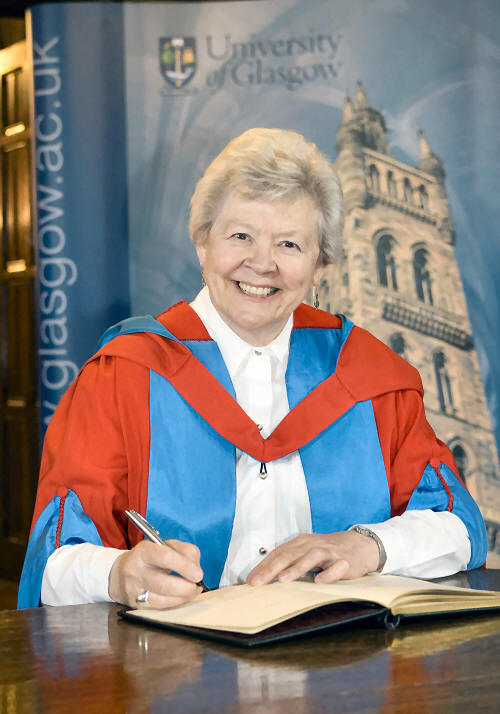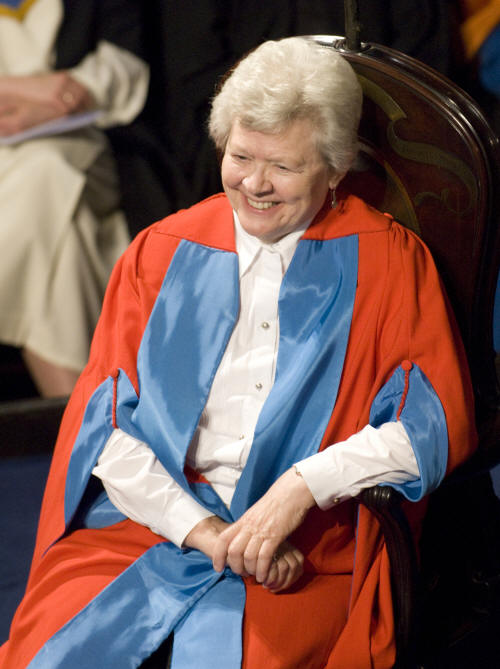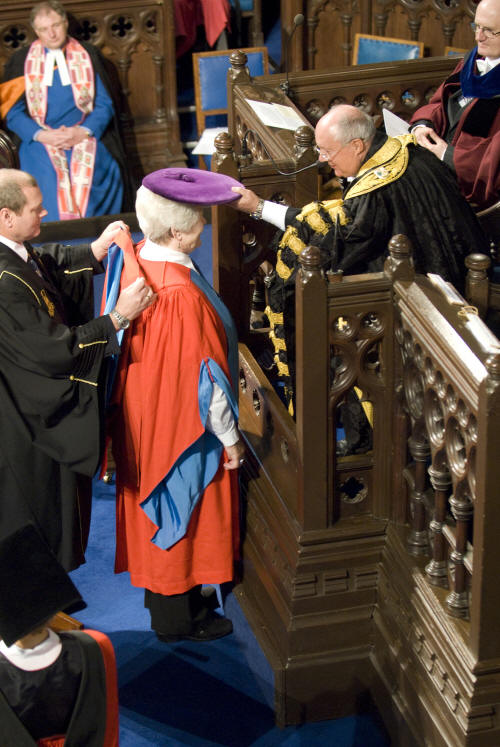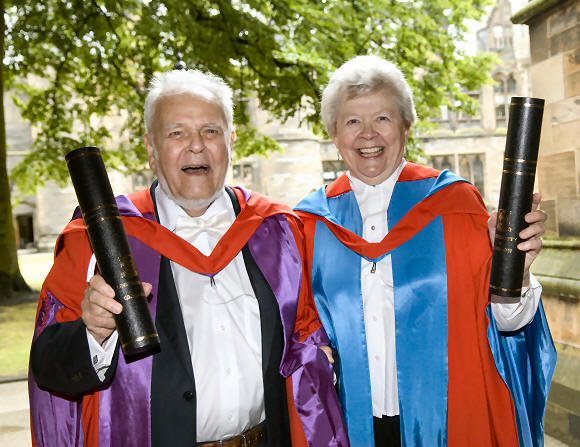|
Edited
by Frank R. Shaw, FSA Scot, Dawsonville, GA, USA
Email:
jurascot@earthlink.net
Sadly singer Jean Redpath has passed away. I knew Jean
for only a short while, like a wisp of wind blowing refreshingly through
the night. I met her at one of Ross Roy’s conferences on Robert Burns in
Columbia, SC a few years ago, and as I sat during her concert that
evening listening to the beautiful renditions of several of Burns’
songs, I marvelled at how calmly she explained the songs before singing
them. I had learned from listening to her CDs just how wonderfully she
sang, and even had some friends tell me to prepare for a masterpiece.
They were correct. She thrilled those in the attendance and before we
knew it, the concert had concluded and we all headed to our hotels or
Starbucks for coffee. Susan and I met up with Debbielee Landi and her
friend Ryan, both from Furman University, who had driven down from
Greenville to hear Jean’s performance. We had a fabulous time discussing
the concert over dessert. Fun evenings come too infrequently, but this
will always be one for the ages!
I mourn with her friends on their loss and remember the
many times her name came up during conversations I had with Ross Roy
over the years. They both received honorary degrees from the University
of Glasgow the same year and were great friends. I’ll always be grateful
to Ross for introducing Susan and me to Jean. It is with pleasure that
we welcome Kirsteen McCue to the pages of Robert Burns Lives! to
better describe Jean Redpath to all of us. (8.4.14)

Jean Redpath, A Memory
By Kirsteen McCue
It is with great personal sadness and also with a certain
warmth that I offer the enclosed memory of the great singer Jean
Redpath, who died last week. I first knew of Jean when I was a child, as
my father, the singer Bill McCue, was often ‘billed’ with her in
performance. But it was as a grown-up and through my work with Glasgow
University’s Centre for Robert Burns Studies that I first really got to
know her, and that’s only within the last few years.
The key link for me was in 2008 when I had begun working
on a chapter for a book that turned out to be called Robert Burns and
Transatlantic Culture (edited by Sharon Alker, Leith Davis and Holly
Faith Nelson for Ashgate). One of the conferences, symposia and other
Burns-related events in 2009 was a major coming together of scholars
from the UK, Europe and ‘across the water’, hosted by Professor Leith
Davis at her Centre for Scottish Studies at Simon Fraser University in
Vancouver. In April 2009 a whole group of Scots headed over there to
join with scholars from North America to give position or discussion
papers on research topics that viewed Burns’s relationship with the
Americas in a new light. My topic was to revisit those fascinating song
settings created from around 1952 until the mid-1970s by American
composer Serge Hovey. As a consequence, I had to spend ‘academic’ time
getting to know Jean and her work, for she had made the only extant
recordings of these settings. We had a frank email exchange that
heavily influenced my own ideas about the project and which were
instrumental in the writing of my chapter for this book.
This all led to an unforgettable time with her, when she
was at home in Scotland at her very lovely house right on the sea wall
at Ely in Fife. Indeed the day I first went to meet her there was one of
those really stormy affairs, when the sea spray came across the wall in
front of the cottage, and when the sky didn’t have time to decide
whether to be cloudy or clear, as the wind was so strong. There were
spectacular rainbows at times when the sun broke through. I am someone
who has spent more of my life on the west coast, but that day I could
see why folks love the east so much, and Jean’s own connection with this
part of the world was clearly very strong indeed.
She greeted me so warmly, welcoming me into her house and
showing me around, and reminiscing of singing with my Dad and of her
very happy working days with Donald Low at Stirling University. Donald
was my first ‘boss’ when I finished by PhD and came to work at Stirling
as a Research Fellow in the University’s Centre for Scottish Literature
and Culture, and he and his wife Sheona were pivotal people in my own
life. Jean brewed some tea and we chatted fondly of both of them and of
happy times at their home in Bridge of Allan. I was full of questions
about Jean’s work on the ‘Scots Musical Museum’ project, which had
happened directly because of Donald’s own passion for Burns’s songs and
his love of Jean’s voice. Donald’s was to be the first facsimile edition
of the Museum since it had appeared in a mid-nineteenth century
edition, and his work was a real stepping-stone on the way to the new
Oxford Burns edition that we’re now working on in Glasgow. Jean
recounted how that project got going, and told me about the time they
spent working through these original songs and making the recordings of
them for Scottish Records. This was often done with a tape recorder in
the front room, and was frequently interrupted by barking dogs!
But she was concerned about the safe-keeping of all of
her materials – the books, music, cassette tapes of all the original
tunes from the Museum – which she’d accumulated to enable
her to best perform this material. Even more notably, she was also
worried about what on earth she should do with all the boxes of
materials connected to the Hovey project. We chatted much about this,
and spent several hours looking at the materials and at other books and
music collections she owned, and talking about what we both thought
about major scholarship on Scots songs and how this influenced the
singing of the songs themselves.

Jean had spoken of her special relationship with Serge
Hovey warmly, but also with characteristic sharpness in various
published interviews across the years and in Tim Neat’s moving
documentary about Hovey’s illness and the creative relationship he had
forged both with Burns and also with Redpath. The bringing together of a
traditional singer, whose introduction to Burns had been slight and was
all based on unaccompanied songs sung by her mother in Fife, with the
musical settings of a man contemporary with Leonard Bernstein, and whose
musical trajectory was so very different from her own, still raises
eyebrows. As she had noted earlier in an email to me, she only ever had
two responses to her Hovey-Burns work: either ‘Best thing you’ve ever
done’ or ‘What did you do THAT for?’ There is no doubt that nearly 30
years after they started making recordings of the songs Hovey’s work
divides most Burnsians in this way. But it was clear to me, as we
chatted, that part of the unique quality about this project had to do
with Jean’s own enquiring mind. She was genuinely interested in how
Hovey worked, in what a composer ‘thought’ and how he achieved his own
artistic targets. And she was keen to see in what ways this newly
acquired knowledge would make itself apparent in her own singing. Many
of the songs, she confessed to me, were learned purely for the project
and, even unaccompanied, some she didn’t ever wish to perform again – a
notable comment on the range of Burns’s song-writing, where the best are
fabulous, but where there are a few that are best forgotten! But working
closely with Serge, she said elsewhere, was a great artistic adventure
and the fact that she was willing to overcome the difficulties of his
illness, where communication was painfully slow and not always direct,
speaks of their tremendous respect for one another as musical creator
and performer.
In 2009 we were delighted when the University of Glasgow
agreed to confer an Honorary Doctor of Music on Jean Redpath, along with
an Honorary Doctor of Letters on Professor G. Ross Roy, great champion
of Burns and of Scottish Literature more widely. Both knew one another
well and were great pals, and both came to Glasgow on a beautifully
sunny June day to receive their degrees in the splendour of Glasgow’s
Bute Hall at the University’s Commemoration Day. Jean did not perform
there, aside from gallantly receiving her degree, but the University’s
Chapel Choir did perform some Burns, including a gorgeous setting of
‘Red Rose’ by Katy Cooper, and this received an appreciative nod from
Jean as she listened. It was a really wonderful day; a fitting event for
that auspicious Burns year for us at the Centre for Robert Burns
Studies. And afterwards, at a lunch hosted by the University’s
Chancellor Sir Ken Calman, Jean did perform to the guests – off the cuff
– relaxed and sweet-toned.
Mine is really a very personal memory – the enclosed
‘oration’ given by Professor Marjorie Rycroft at the Degree Ceremony
that memorable June day gives a more detailed biography of Jean, and her
own website (which she also chatted lots about that day in Fife) gives
even more detail at
http://www.jeanredpath.com
I am indebted to Jean for sharing her thoughts and the
wisdom of a lifetime of singing our nation’s songs with me. I’m sorry I
didn’t get the opportunity to spend more time with her.
Kirsteen McCue, Co-Director, Centre for Robert Burns
Studies at the University of Glasgow –
http://www.gla.ac.uk/robertburnsstudies/
FROM THE
UNIVERSITY OF GLASGOW I SHARE HER HONORARY DEGREE WITH OUR READERS
Commemoration Day

17 June 2009
Redpath
Jean Redpath
was born in Edinburgh and brought up in Fife, where from an early age
her musical talent was nurtured by her parents, both of whom were keen
folk musicians. She learnt her first songs from her mother, and by the
age of 10 was already making a name for herself as a folk and ballad
singer. Since these early days Jean, who has never received any formal
musical education, has continued to learn her folkmusic by ear.
On leaving
Buckhaven High School she went to Edinburgh University to read Medieval
History and English. Folk music continued to play a big part in her
life, however, and she made good use of the university’s School of
Scottish Studies with its rich collection of recordings of instrumental
music, Gaelic and Scots songs, poetry and folk tales. It was there that
she met her ‘guru’ and mentor, Hamish Henderson, co-founder of the
School and pre-eminent folklorist of the day. Inspired and encouraged by
him, Jean began to explore new repertoire that helped forge her career.
In 1961 she
headed for the States, arriving with only 11 dollars in her pocket. Life
was tough, but, as she recalls, after several weeks ‘living on peanut
butter and jelly’, she had a lucky break. By chance she found herself
singing at a hootenanny in Greenwich Village, in the company of Bob
Dylan, Ramblin’ Jack Elliott and others. This brought her to the
attention of promoters and she was invited to sing at Gerde’s Folk City,
receiving a rave review in the New York Times for her ‘clear,
rich, beautiful mezzo-soprano’ voice. Her career was launched. She was
soon to be found on the American folk music circuit appearing with Joan
Baez, Mike and Pete Seeger, Bill Munroe and the Bluegrass Boys to name
but a few.
A decade
later Jean embarked on two ground-breaking Burns projects – one in the
States, the other in Scotland. In 1972 Serge Hovey, American
composer/arranger and pupil of Arnold Schoenberg, contacted her on the
recommendation of Hamish Henderson and invited her to record some of his
arrangements of Burns songs. It was to be the start of a 20-year
project. Some have expressed surprise that she agreed to undertake such
a project, for Hovey’s musical style and harmonic language are very
different from those of the folk songs with which she was familiar. And
indeed for Jean, who claims not to read music, it must have been a real
challenge. Nothing daunted, however, she rose to the task, learning her
notes aurally from specially pre-recorded piano tapes. A total of 7 LPs
were produced, all to great critical acclaim.
At about
the same time she embarked on her second Burns project with Donald Low
of Stirling University – recording the songs in the Scots Musical
Museum. This, Chancellor, was a project with which she felt much
more at home. As she herself has said: ‘The Hovey project was like
learning a foreign language for me, the Scots Musical Museum project was
one I already spoke.’
Jean has a bubbly personality with an infectious sense of
humour. Her enthusiasm for the folk music of her native land is apparent
to all who come in contact with her. An inspired teacher she has held
posts as artist-in-residence at Wesleyan University, Connecticut and at
Stirling University. Without doubt she is one of the pioneering figures
in Scottish folk music. Mention her name and another springs immediately
to mind – that of Robert Burns. It is therefore most appropriate, that
in 2009, the anniversary of Burns’s birth and Scotland’s Year of
Homecoming, that the University should honour ‘the world’s pre-eminent
interpreter of the songs of Robert Burns’.
It is with great pleasure, Chancellor, that I invite you
to confer the honorary degree of Doctor of Music on Jean Redpath.

A collection of videos of her singing is
available on YouTube at
https://www.youtube.com/watch?v=BnI9EWQr_K0&list=PLLKu4d-qUaWJNc8gOYxiuwTMeHuD0KiZF
|

